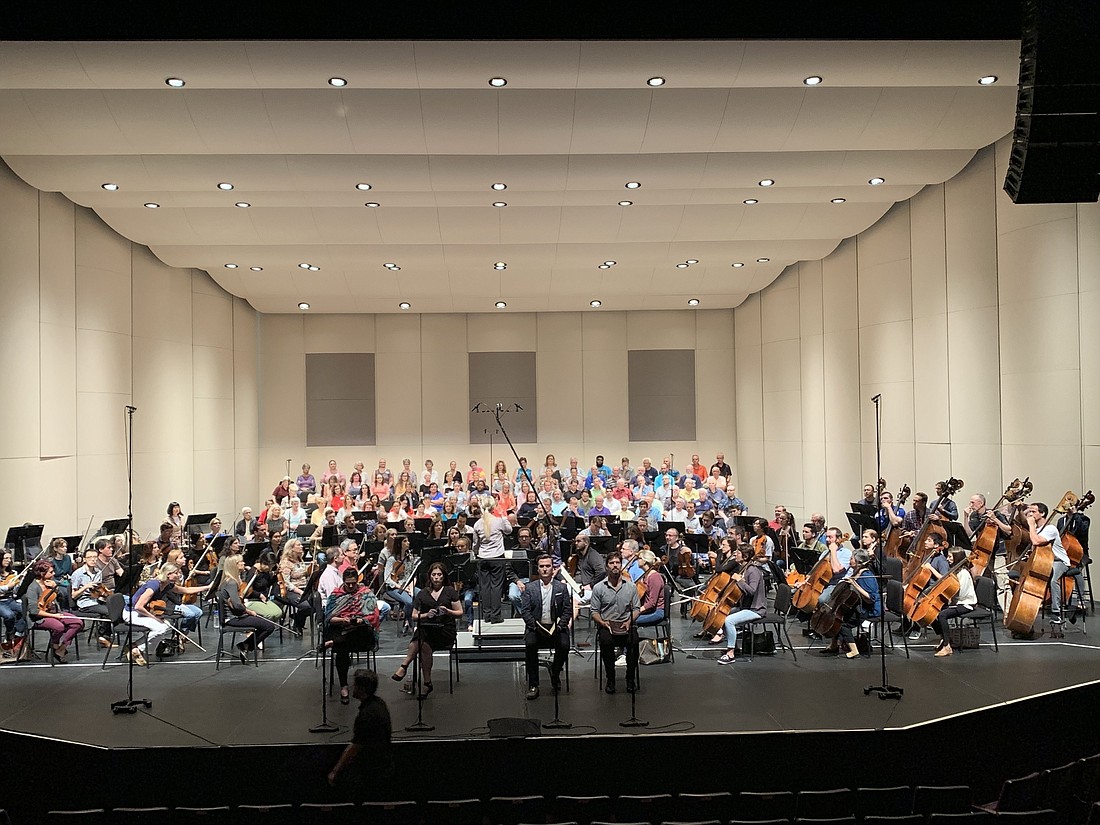- November 8, 2024
-
-
Loading

Loading

It seems that whenever Beethoven’s 9th Symphony is performed, it’s always an emotional occasion. In Japan during Holiday season, performances are as plentiful as Handel’s “Messiah” are in this country. Surely the most festive and emotional performance of the Ninth was in Berlin 1989, with Leonard Bernstein conducting as the Berlin Wall was coming down. He had the singers substitute the word “Freedom” for “Joy” in the final choral section.
This past weekend, Anu Tali, in her final series as music director of the Sarasota Orchestra, gave us an emotional and moving performance of this monolithic work, assisted by a quartet of stellar soloists and singers from the Choral Artists of Sarasota and Key Chorale.
Opening the concert was Schoenberg’s “Friede auf Erden” (Peace on Earth). This short choral work was written in 1906, before Schoenberg completely abandoned tonality for abstract expressionism. First written for unaccompanied voices, Schoenberg later added instrumental accompaniment to help guide the singers through his ever-shifting chromatic harmonies of wandering tonality. The piece meanders chromatically in a chorale-like movement, becoming denser and more complicated before ending in a most welcome pure major chord.
The Choral Artists of Sarasota sang with accuracy and musicality, guiding us easily through Schoenberg’s thickets of harmony and melody.
While Beethoven was a master of instrumental music, his writing for the human voice is almost abusive, with sustained forte passages at the upper limits of the range, especially for the sopranos and tenors. A good performance of his 9th Symphony requires singers able to sustain this vocal pummeling, and I’m happy to write that both chorus and soloists rode out these passages with great aplomb.
Elizabeth Baldwin’s sharply focused soprano surmounted those thorny passages with seeming ease, and tenor Miles Mykkanen, national winner of the Metropolitan Opera auditions, sang his solos and duets with good pitch and bravado.
Branch Fields sang his opening recitative with his bass voice commanding authority, and his duet with the tenor was excellent. The mezzo-soprano part of the quartet is probably one of the more thankless roles in singing, since it is important, but usually goes unheard, due to the density of the writing. Happily, Blythe Gaissert easily overcame this obstacle and all four voices were heard equally.
The 95 voices of the Choral Artists of Sarasota and Key Chorale sang heartily and musically, avoiding the “musical shouting” that is often heard in performances of the 9th.
And that leaves us with the Sarasota Orchestra in this valedictory concert of Tali. The sound of the orchestra itself speaks volumes to her accomplishments during her tenure. The strings are bolder, yet more homogeneous; the winds accurate, sparkling and controlled; the brass and percussion are strong and aggressive as always, yet with a new voice and purpose.
In her final concert on Sunday afternoon, the musicians were in top form, giving every nuance and phrase special meaning in what had to be a personally sentimental performance for all.
Tali’s Beethoven is much more linear in its phrasing than the almost peasant-like verticality he seems to imply in his notation. Yet, she made her point with this approach, although to me the music seemed a bit breathless and needed to “breathe” just a bit.
Nevertheless, it was a thrilling concert and the audience rose as one to its feet for ovation after ovation.
Tali spoke at the end, opening with, “This is not a sad day,” to which a voice from the rear of the audience called out, “Yes, it is.” Then, after a few more words while barely containing her emotion, she said, first to the audience, “You will be just fine,” and then turning to the orchestra, said it again, “You will be just fine.” And after shaking hands around, she left the stage for the final time, carrying a large bouquet of flowers.
Yes, we will be “just fine,” but we will miss Anu Tali, until the next time, which we hope is not too far away.